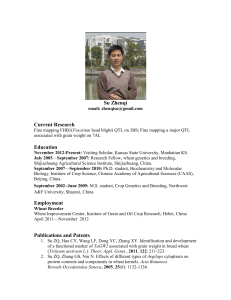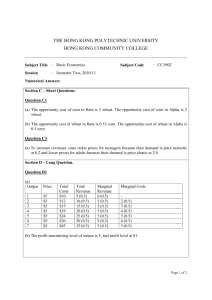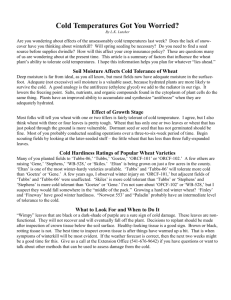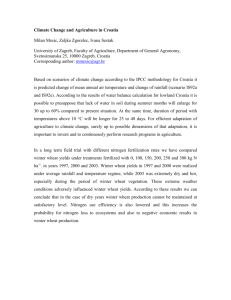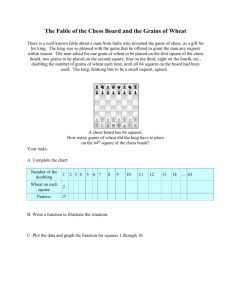View Presentation
advertisement
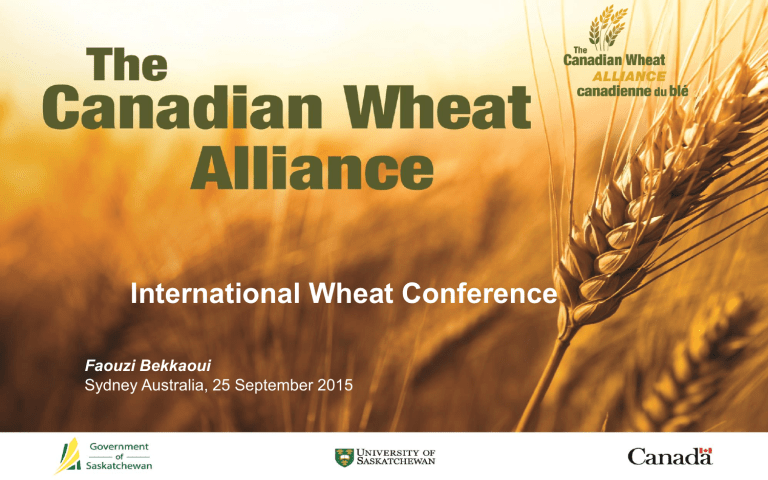
International Wheat Conference Faouzi Bekkaoui Sydney Australia, 25 September 2015 1 Presentation Outline • • • • Wheat in Canada Goal of Canadian Wheat Alliance Pillars objectives – projects update CWA collaborations Wheat: A Canadian Perspective • Production 2013: 37.5M tonnes [global production ~650M tonnes] - 6th largest producer • Third largest exporter - 19.6M tonnes in 2013, valued at $6.7B o Saskatchewan province alone produced 34% of the world’s durum exports 3 Start Nationally – aligning Canadian public effort 2012-2022 Members: Agri-Food and Agriculture Canada (AAFC), University of Saskatchewan (Crop Development Centre), National Research Council (NRC), and the Government of Saskatchewan ~ $95M committed for the first 5 years, with an overall 11 year commitment to align complementary expertise and capacity in high priority research areas 4 CWA Goal Improve the yield, sustainability, and profitability of wheat for the benefit of the Canadian farmers and economy 5 Locations of CWA Research Teams - 53 Scientists - 125 FTE - 48 projects Moncton, NB Edmonton, AB Saskatoon, SK Summerland, BC Lethbridge, AB Swift Current, SK 6 Fredericton, NB Morden, MB Montreal, QC Ottawa, ON Charlottetown, PE Halifax, NS Current CWA activities along the development pipeline Novel germplasm Improved Varieties Increased Yield *Outputs from existing activities will be incorporated into novel germplasm/improved varieties 7 1- Genomics-Assisted Breeding (GAB) NRC : A Sharpe (Pillar lead), P Fobert, J Nowak, Y Pan, D Tulpan AAFC: R Knox, Y Ruan, R Cuthbert, M Jordan, C McCartney, T Ouellet, G Fedak UofS/CDC: C Pozniak, B Fowler • Objective: To improve genomic resources to speed up gene discovery, novel trait identification and validation, and marker assisted breeding • Eight Projects • Project Example: Generating Strategic Genome Sequence Data for Wheat Cold tolerance in wheat Objective: Build genomic resources for comparative analyses of cold tolerance in wheat and rye. Accomplishments: • High molecular weight DNA isolation protocol from cereal nuclei optimized (yield ~ 1 mg). • Protocol for making many diverse mate-pair libraries developed and successfully deployed. • Whole chromosome shotgun assemblies for winter wheat chromosome 5A and rye chromosome arm 5RL with groundbreaking contiguity. Collaborations: • Chromosomal flow-sorting and amplification – Jaroslav Dolezal, Institute of Experimental botany, Czech Republic. D. Konkin, B Fowler, A. Sharpe 2-Wheat Improvement through Cell Technologies (WICT) NRC: P Polowick (Pillar Lead), A Ferrie, J Hammerlindl, U Hemraz, A Kell, E Marillia AAFC: F Eudes • Objective: To deliver efficient low cost cell technologies that accelerate the development of superior wheat cultivars • Six projects • Project Example: Development of an isolated microspore culture system for spring and winter wheat Wheat microspore culture-doubled haploidy Spring wheat • Breeders goal- 15 green plants/spike With new conditions— • Success with 9 of 12 cultivars • Conversion of embryos to green plants at 20 - 70/spike with best cultivars Potential impact: Reducing breeding costs and Shortening breeding cycle by 2-4 years 11 A. Ferrie & F. Eudes 3- Enhanced Fusarium and Rust Tolerance (EFRT) NRC: M Loewen, (Pillar Lead), P Fobert, R Purves, A Sharpe, I Zaharia, Y Pan, P Vrinten, M Cuperlovic‐Culf, Y Wang AAFC: G Bakkeren, A Laroche, N Foroud, H Randhawa, M Jordan, B McCallum, C Hiebert, C McCartney, L Harris, T Ouellet, J Singh, G Subramaniam, UofS /CDC: C Pozniak • Objective: To characterize genes, proteins and metabolites involved in microbial pathogen resistance, and develop tools for accelerated breeding of durable resistance against fusarium and rust. • 17 projects • Project example: Mechanistic Characterization of Durable Rust Resistance EFRT: Lr34Sus de-orphanized and differentiated from Lr34Res Potential impact: Understanding the mode of action of rust tolerance that will allow the design of new molecular breeding strategies to reduce rust disease M. Loewen 4-Improving Abiotic Stress Tolerance NRC: J Zou (Pillar Lead), A Cutler, R Datla, Y Pan, G Selvaraj AAFC: R Cuthbert, Y Ruan, R Knox, H Wang UofS: B Fowler • Objective: To improve drought, heat and cold tolerance of wheat • Eight projects • Project example: Selecting candidate genes for introgression of drought/heat stress traits in spring bread wheat and durum Toward improving drought tolerance in Canadian wheat (1) • • • Identify drought-related traits in wheat germplasm Investigate the genetic underpinnings of prioritized traits Develop molecular tools to aid breeding for drought tolerance Example: Pelissier has more robust roots • Scalable phenotyping in a standard greenhouse • Roots can be retrieved at desired phenological stages Pelissier Strongfield 15 Toward improving drought tolerance in Canadian wheat (2) • Established a whole phenology phenotyping platform in a standard greenhouse that will allow assessment of roots • The highest acreage cultivar Strongfield is better than the older cultivar Pelissier for photosynthesis (both durum wheat) • Pelissier has greater drought tolerance traits: root biomass; WUE; grain yield under stress, in contrast to Strongfield • A genetic map of Pelissier X Strongfield was constructed. • Transcriptome analysis of selected organ/tissue was performed for gene discovery and pathway analysis. G. Selvaraj 16 5-Targeting Developmental Pathways to Improve Performance and Yield in Wheat (Development Pilar) NRC: R Datla, NRC (Pillar Lead), E Wang, J Nowak UofS/CDC: C Pozniak AAFC: J Singh, M Jordan, L Robert, A Laroche, G Subramaniam, R Cuthbert Objective: Genetic improvement of productivity in wheat Four Projects. Project example: Gene expression atlas of whet seed development Developmental Analysis of Wheat Grain (1) 18 (A) Isolated embryo sac (ES) free nuclear endosperm (En) and embryo (Em). Mid-stage (B) and latestage (C) grain with part of the pericarp (PC)). (D) Mature wheat grain with fully formed bran that includes the pericarp and the seed coat layers. (E) two-cell; (F) four-cell; (G) eight-cell embryos (H) In the transition stage embryo, a laterally placed region of proliferating cells (red circle) marks the site of the scutellum and meristem formation. (I) Scutellar embryo stages show the scutellum (SC), coleoptile (CP), shoot apical meristem (SAM) and the associated leaf primordium (LP) formation, epiblast (EPI) and coleorhiza (CR). (J) Mature embryo Key findings from grain transcriptome studies (2) • 65-70% of annotated genes expressed during grain development in hexaploid (AABBDD), tetraploid (AABB) and diploid (AA) genomes • Dominantly or differentially expressed genes identified in endosperm, embryo and pericarp tissues • Genes highly expressed in embryo or endosperm or pericarp display similar pattern between species • Significant number of orthologues display differential expression R. Datla 6-Beneficial Biotic Interactions (BBI) NRC: S Hemmingsen (Pillar Lead), C Greer, S MacKinnon, L Masson, A Sharpe AAFC: T Dumonceaux, M Fernandez, M Links, A Mills, R Martin UofS/CDC: C Pozniak • Objective: To improve nutrient-use efficiency and plant health through understanding and managing relationships between beneficial microorganisms and wheat • Six projects • Project Example: Effects of fertilizer use on wheatassociated microbial communities Historical ABC Rotation – Lethbridge, AB Effects of long-term fertilization and crop rotation regimes on soil, rhizosphere, and rhizoplane microbial communities Established in 1911 Rotations A: Continuous wheat B: Wheat – Fallow C: Wheat – Wheat – Fallow Fertilizer Treatments Check no fertilizer P phosphate only N+P nitrogen + phosphate N nitrogen only B. Helgason Potential impact: Improving soil health and reducing fertilizer input CWA Collaborations • KWS & Syngenta: to develop an efficient microspore based DH system in Spring and Winter wheat • CIMMYT: to reduce the effects of wheat rust diseases and of Fusarium head blight in Durum wheat • Germany collaboration (FusResist): to improve Fusarium resistance in wheat 22 Acknowledgements • • 23 Research team Funding partners CWA Management Committee Members Jalil Abdul (Government of SK) Faouzi Bekkaoui (NRC), Chair George Clayton (AAFC) Felicitas Katepa-Mupondwa(AAFC) Jerome Konecsni (Government of SK) Bob Tyler (U of S) Graham Scoles (U of S) Donna Viger (NRC) Faouzi.Bekkaoui@nrc-cncrc.gc.ca http://canadianwheatalliance.ca/ 2 4 24
